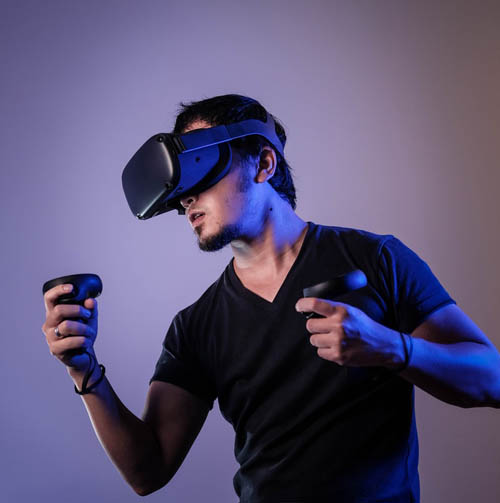Greater realism or believability motivates gaming developments. The goal is immersion, where game-world and real life are indistinguishable. Though, this kind of immersion isn’t the only kind of immersion. Not all developers want to replicate their reality in their work. People don’t just get lost or lose themselves in an open-world game because the grass and trees look and move like they should or a character is step-by-step perfectly disassembling a tractor engine on the side of a road which there’s no good reason to venture down. Depth, and then immersion, comes via level design and game mechanics too. If everything is smooth and clean then it’s easy for gamers to settle in, to believe.
The two aren’t exclusive. If you have one, it doesn’t mean you can’t have the other. Virtual reality headsets are more associated with immersion-by-reality, as opposed with immersion-by-mechanics. It’s in the name, so excusing those assumptions is easy. And, at this point, it’s true that most of VR’s scope is based on how well it convinces gamers that they are where they see and hear themselves to be, as opposed to having fluid gameplay.

VR and Entertainment
VR is having success in numerous genres. There’s the VR-exclusive games like Beat Saber, a game inspired by the likes of Rock Band and Guitar Hero but built for VR’s mechanics, and Half Life: Alyx which is a sequel and extension – the first in thirteen years – of the hugely successful Half Life video games series which made itself known on console and PC.
Outside of video games, it’s use in the online casino and poker industry is well documented. Sites like GGpoker.co.uk offer the traditional games as well as online variances which focus on speed-of-play and jackpots. They create an environment that is both realistic and immersive with the aforementioned emphasis on slick games and believable environments. They use features like SnapCam so gamers can video themselves and send it to the table. Some sites offer live online poker and casino games, where table dealers are streamed to a player’s screen so they can interact with one another – the experience being much closer to the traditional poker of brick-and-mortar establishments. It’s the pursuit of a new level of immersion which drives this. It’s appealing because while they enjoy the convenience and exclusive bonuses and games offered by online casinos, gamers like further immersion and new ways to socialise.
Horror Video Games
Horror video games are a popular genre. Many games have received movie adaptations and many films have received game adaptations. The likes of Silent Hill, Dead Space, and Resident Evil, and then the horror elements in Left 4 Dead and Doom are all highly regarded by critics and fans alike. They’ve successfully done what horror must do: convince the gamer that they are here, right where the game wants them.
VR Games and Installations
Virtual reality holds a lot of promise for horror fans especially. Horror films, books, and media in general seeks to embed the audience in a new world. Even if that word is ninety-nine percent the same as the one the gamer lives in, it needs to be convincingly the same, ready for the one-percent difference to make itself known.
Many horror fans attend installations and exhibitions, such as haunted houses, to get their thrills. These experiences are usually short. They get the audience inside and the jump-scares come thick-and-fast. This level design translates well to VR. Games like Affect: The Manor have made a success of it. For new VR users, this game’s scope might be a perfect introduction to the horror genre.
Expansive horror games are available too, and, notably, they have recognisable names: The Exorcist: Legion and Resident Evil 7: Biohazard. These are higher-budget productions which give gamers plenty of story to immerse themselves in, with those looming ambient scares very present before the jumps.
With VR’s introduction into the gaming world, it’s distinction with movies will become weaker and weaker. Could it be that major Hollywood productions favour the VR setting – producing installations similar to that of 4D cinema – as opposed to the traditional big screen to put an audience’s heart in their mouth?

